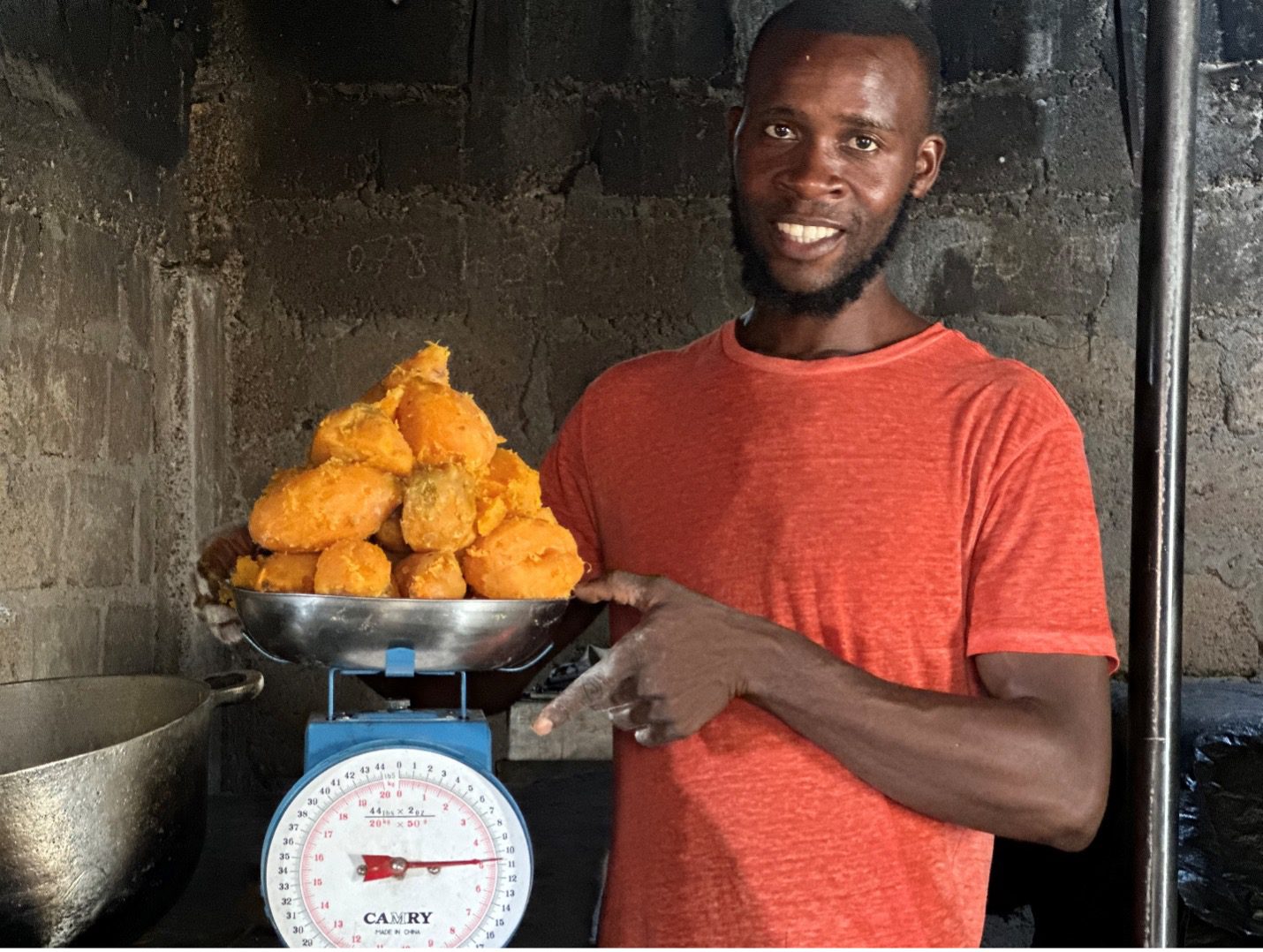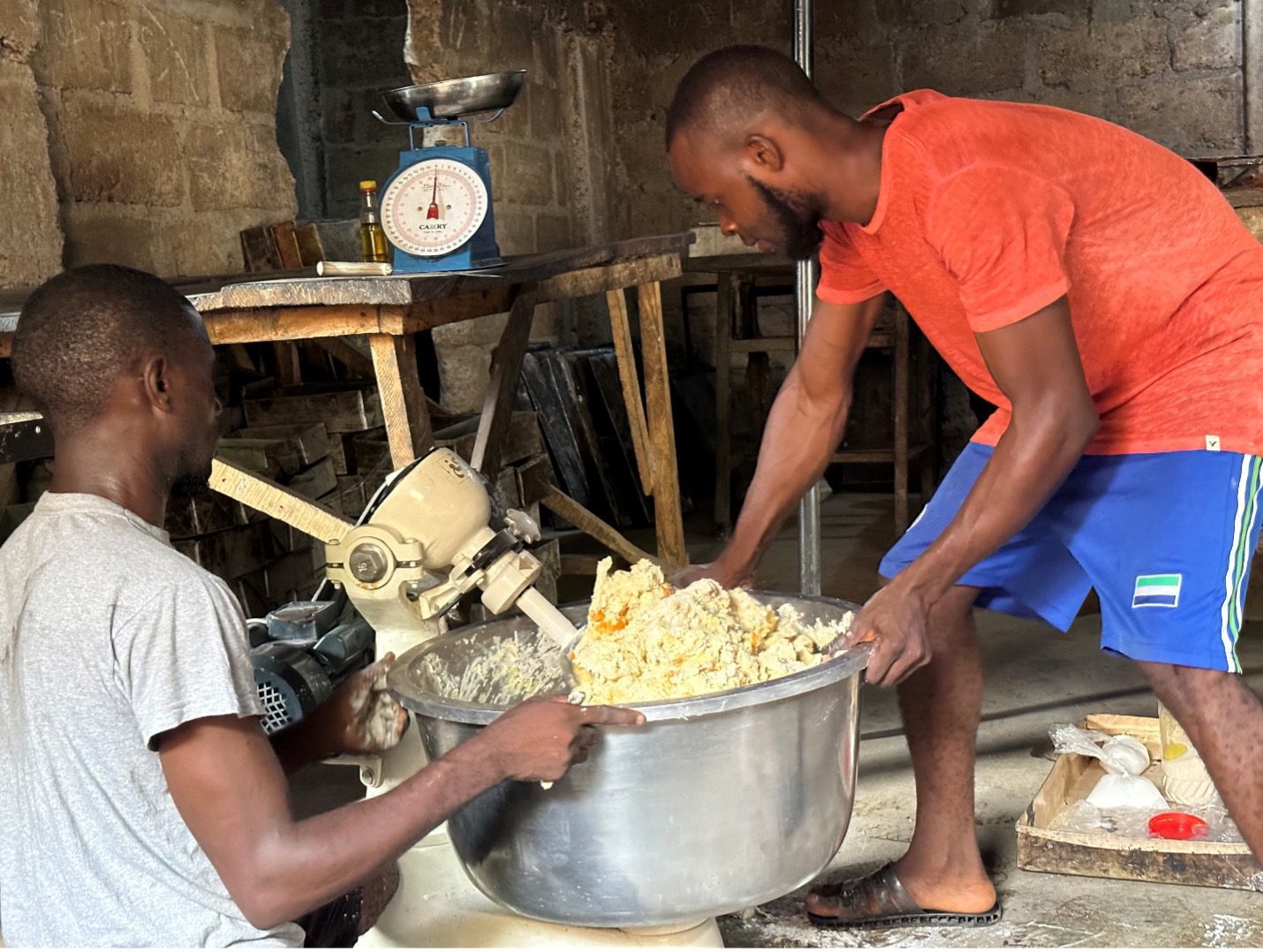How Baking Bread is Changing Lives: The Success of Sweet Potatoes
Five years ago, a difficult economic situation forced Thaimu Banugura to leave his hometown, Jaiama Nimikoro Kono, in the Eastern Province of Sierra Leone. Despite having completed his West African Certificate Exams to graduate from secondary school, Thaimu struggled to find work in his new home of Makeni in Sierra Leone’s Northern Province, and he was forced to take jobs that required backbreaking labor just to make ends meet.
This was not the life Thaimu imagined for himself. “I’ve always wanted to learn a skill and go to the university but the conditions to achieve my goal were not available.” Instead, he said, “I spent two years [going] from one laborer [job] to another. Things were hard. I returned to my mom’s village to assist her with the farm work.”
Determined to overcome hardships and build a better life, Thaimu never expected that something as simple as baking bread would eventually change his life.
Searching for a Better Future
Twenty-eight-year old Thaimu saw an opportunity to learn a trade and enrolled in a bread-making course at a vocational institute. Within two years, he became a qualified baker. Although proud of his accomplishment, he found it hard to stand out with the same bread-making process and standard wheat flour recipe that have been used for centuries.
Thaimu felt stuck and unsure of his options. He wanted to keep the promise he made to his mother to find a better life and needed his work to provide financial security to do that. Something had to change.
The Rise of the Mighty Sweet Potato
At the same time Thaimu was searching for innovative ways to achieve his baking dream, Helen Keller Intl was introducing communities to new nutritional agriculture. Around the world, including in Sierra Leone, Helen Keller helps communities establish home gardens and farms to ensure sustainable nutrition. This includes training on and support for growing, selling, and processing nutrient-rich foods, like orange-fleshed sweet potatoes.
Sweet potatoes are a nutritional powerhouse, rich in complex carbohydrates, fiber, and vitamins and minerals. The orange-fleshed variety is a particularly good source of vitamin A, which is critical for early childhood nutrition and development. Vitamin A deficiency is the leading cause of childhood blindness and hinders the immune system, leaving children vulnerable to other ailments.

Like nearly all other foods, orange-fleshed sweet potatoes must be processed before being eaten. While processed foods have gained a negative reputation, not all forms of processing are unhealthy. Processing nutritious food can even have positive impacts on the food system when used to preserve food to help prevent food spoilage and waste, diversify the food options available to promote a more varied diet, and increase the nutritional value of foods by incorporating nutrient-rich ingredients. In addition, it offers economic benefits to those who learn processing techniques through new income generation and entrepreneurship opportunities, as Thaimu would soon learn.
Proofing a Concept, A New Skill
In Thaimu’s district, the Ministry of Agriculture and Food Security reached out to the Bakers Association to find bakers who would be interested in increasing the nutritional value of their bread with orange-fleshed sweet potatoes. When Thaimu heard about this opportunity, he was among the first people to volunteer for the program.
Thaimu and 24 other young people participated in a week-long practical training, organized by the Bakers Association in partnership with the Ministry of Agriculture and Food Security and Helen Keller. During the training, participants learned how to use the orange-fleshed sweet potato as a partial substitute for wheat flour in bread recipes. This technique adds vital nutrients to the bread, including vitamin A. Fortifying foods like bread with these essential vitamins and minerals helps address malnutrition and improve nutrition for the entire community.
Rising to New Heights
Once Thaimu finished the training, he was inspired to perfect his bread recipe. As he recalled his journey, he flashed a large smile, “On three occasions I missed the formula, but on the fourth time it was perfect.”
In addition to his training, Thaimu received a micro-finance loan; equipment, including baskets for his supplies and a dough mixer; and a certificate from Sierra Leone’s Standards Bureau confirming that his orange-fleshed sweet potato bread was ready and safe to eat.

With the income that Thaimu generates from selling his orange-fleshed sweet potato bread, he has paid for schooling and earned a Higher Teachers Certificate in Business Studies. He also helps promote this nutrient-rich staple and youth entrepreneurship opportunities through trainings. Using his knowledge and experience, Thaimu has conducted trainings for young people in his community and other parts of the country on the orange-fleshed sweet potato’s nutritional value and how to use it as an affordable and nutritious alternative to traditional bread.

Provide opportunities for youth like Thaimu to achieve their true potential.









